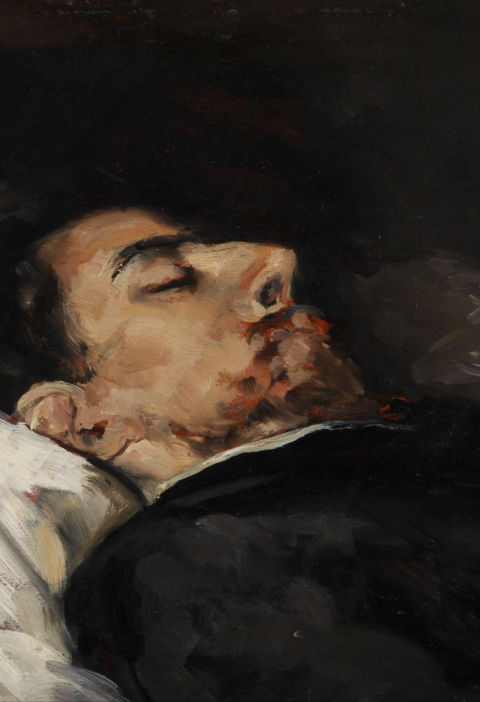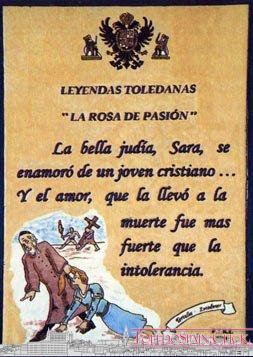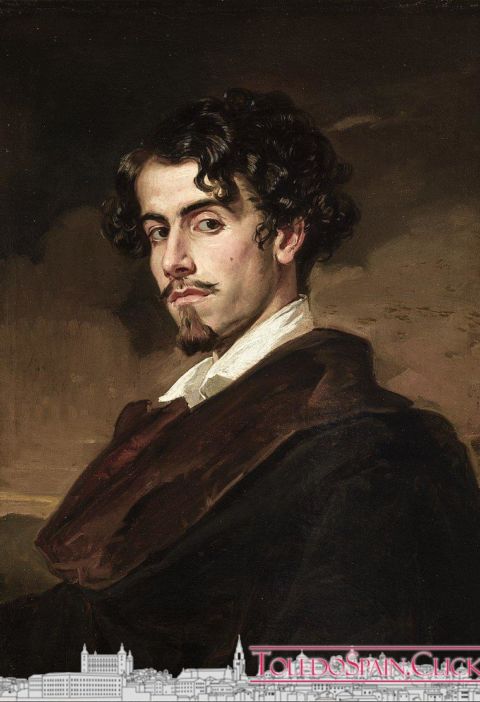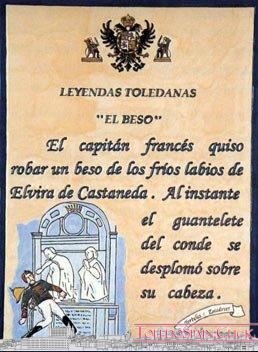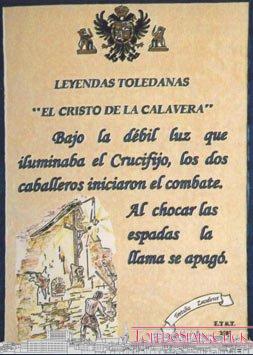She was beautiful, beautiful with that beauty that inspires vertigo, beautiful with that beauty that is nothing like the one we dream of in angels and yet is supernatural; diabolical beauty, which perhaps the devil lends to some beings to make their instruments on earth.
He loved her; he loved her with that love that knows no restraint or limit; he loved her with that love in which one seeks joy and only martyrdom is found, love that resembles happiness and yet it would be said that Heaven infuses it for the atonement of guilt.
She was capricious, capricious and extravagant, like all the women of the world; he, superstitious, superstitious and brave, like all the men of his time. Her name was María Antúnez; he was Pedro Alonso de Orellana. Both were Toledans, and both lived in the same city where they were born.
The tradition that refers to this wonderful story happened many years ago, says nothing more about the characters who were their heroes.
I, as a true chronicler, will not add a single word of my harvest to characterize them; better.
He found her crying one day, and he asked her:
Why are you crying?
She wiped her eyes, stared at him, took a sigh and cried again.
Peter, then, approaching Mary, took her hand, leaned his elbow on the Arabian parapet from where the beautiful woman watched the current of the river go by, and again said to her:
Why are you crying?
The Tagus twisted, groaning at the foot of the lookout, among the rocks on which the imperial city sits. The sun transposed the neighboring mountains; the afternoon fog floated like a veil of blue gauze, and only the monotonous noise of the water interrupted the high silence.
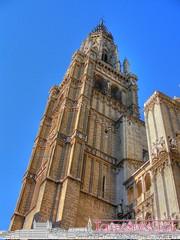 Mary exclaimed:
Mary exclaimed:
Don’t ask me why I’m crying, don’t ask me, because I won’t know how to answer you or you won’t understand me. There are desires that drown in our woman’s soul, without it revealing them more than a sigh; crazy ideas that cross through our imagination, without us daring to formulate them, incomprehensible phenomena of our mysterious nature, that man cannot even conceive. I beg you, do not ask me the cause of my pain; if I were to reveal it to you, perhaps I would snatch a laugh from you.
When these words expired, she again bowed her forehead and he reiterated his questions.
The beautiful, finally breaking her stubborn silence, said to her lover in a muffled, choppy voice:
You want it; it’s madness that will make you laugh; but it doesn’t matter; I’ll tell you, since you want it. Yesterday I was in the temple. The feast of the Virgin was celebrated, her image, placed on the high altar on a golden footstool, shone like an ascue of fire; the notes of the organ trembled, echoing echo by echo throughout the church, and in the choir the priests sang the Salve, Regina. I prayed, I prayed absorbed in my religious thoughts, when machinally I raised my head and my eyes went to the altar. I do not know why my eyes were fixed, of course, on the image; I say badly; in the image, no; they were fixed on an object that, until then, I had not seen, an object that, without being able to explain it to me, called my attention to itself… Don’t laugh…; that object was the golden ajorca that the Mother of God has in one of the arms in which her Divine Son rests… I looked away and turned to pray… Impossible! My eyes involuntarily turned to the same point. The lights of the altar, reflected in the thousand facets of its diamonds, were reproduced in a prodigious way.
Millions of sparks of red and blue, green and yellow light turned around the stones like a whirlwind of fire atoms, like a vertiginous round of those spirits of flames that fascinate with their brightness and incredible restlessness… I left the temple; I came home, but I came with that idea fixed in my imagination. I lay down to sleep; I could not… The night passed, eternal with that thought… At dawn my eyelids closed, and will you believe it? still in my dream I saw a woman cross, get lost and become again a woman, a beautiful and dark woman, who wore the jewel of gold and stones; a woman, yes, because it was no longer the Virgin I adore and before whom I humble myself; it was a woman, another woman like me, who looked at me and laughed at me, mocking at me. Do you see her? She seemed to tell me, showing me the jewel. How she shines! It looks like a circle of stars torn from the sky on a summer night. Do you see it? Well, it is not yours, it will never be yours, never… You may have better, richer ones, if possible, but this one, this one, which shines in such a fantastic, fascinating way… never, never. I woke up, but with the same idea fixed here, then as now, similar to a burning nail, diabolic, incontrovertible, undoubtedly inspired by Satan himself… So what?… Shut up, shut up and bend your forehead… Doesn’t my madness make you laugh?
I’m sure you’re also interested: The Alley of the Just Judge
Peter, with a convulsive movement, pressed down the fist of his sword, raised his head, which he had indeed bowed, and said with a deaf voice:
-What Virgin has this award?
-The one in the tabernacle murmured Mary.
-The one in the tabernacle! -The young man repeated with an accent of terror. The one of the Tabernacle of the Cathedral!…
And in his features he portrayed for a moment the state of his soul, frightened of an idea.
-Ah! Why doesn’t another Virgin possess it? -Why doesn’t the archbishop have it in his mitre, the king in his crown, or the devil in his claws? I would tear it off for you, even if it cost me my life or my damnation. But to the Virgin of the Tabernacle, to our Patron Saint, I…, I, who was born in Toledo, impossible, impossible!
-Never! -Mary murmured in an almost imperceptible voice. Never!
And she kept crying.
Peter fixed a stupid gaze on the stream of the river; on the stream, which passed and passed ceaselessly before his lost eyes, breaking at the foot of the lookout, among the rocks on which the imperial city sits.
Toledo Cathedral! Figures a forest of gigantic granite palm trees that intertwine their branches to form a colossal and magnificent vault, under which they shelter and live, with the life that has lent, the genius, a whole creation of imaginary and real beings.
An incomprehensible chaos of shadow and light appears, where the colored rays of the warheads are mixed and confused with the darkness of the ships, where the brightness of the lamps is lost with the darkness of the sanctuary.
Imagine a world of stone, immense as the spirit of our religion, dark as its traditions, enigmatic as its parables, and yet you will have no remote idea of that eternal monument of the enthusiasm and faith of our elders, on which the centuries have poured the treasure of their beliefs; of their inspiration and of their arts.
In its bosom live silence, majesty, the poetry of mysticism and a holy honor that defends its thresholds against worldly thoughts and petty passions of the earth. Material consumption is relieved by breathing the pure air of the mountains; atheism must be healed by breathing its atmosphere of faith.
But if great, if imposing, the cathedral presents itself to our eyes at any time when one enters its mysterious and sacred enclosure, it never produces such a profound impression as on the days when it displays all the galas of its religious pomp, when its tabernacles are covered with gold and stones; its steps, carpets, and its pillars, tapestries.
Then when a torrent of light bursts its thousand silver lamps; when a cloud of incense floats in the air, and the voices of the choir and the harmony of the organs and bells of the tower shake the building from its deepest foundations to the highest needles that crown it, then is when one understands, as one feels it, the tremendous majesty of God, who lives in it, and animates it with his breath, and fills it with the reflection of its omnipotence.
On the same day that the scene we have just referred to took place, the last of the magnificent octave of the Virgin was celebrated in the cathedral of Toledo.
The religious feast had brought to it an immense multitude of faithful; but this had already dispersed in all directions, the lights of the chapels and of the main altar had already been extinguished, and the colossal doors of the temple had squeaked on their hinges to close behind the last toledano, when from among the shadows, and pale, as pale as the statue of the tomb on which he leaned for an instant while dominating his emotion, a man came forward sliding with the greatest stealth to the gate of the cruiser. There, the clarity of a lamp made it possible to distinguish its features.
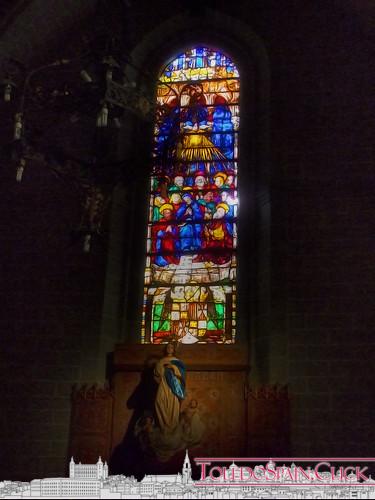
It was Pedro.
What had happened between the two lovers so that they would finally be arrested for putting into practice an idea that only when they conceived it had made their hair stand up in horror? It could never be known. But he was there, and he was there to carry out his criminal purpose. In his restless gaze, in the trembling of his knees, in the sweat that ran in wide drops down his forehead, he had his thought written.
I’m sure you’re also interested: 50 essential things to do in Toledo (Version 2023)
The cathedral was alone, completely alone and submerged in a deep silence. Nevertheless, from time to time they were perceived as confusing rumors: perhaps wooden clicks, or murmurs of the wind, or, who knows, perhaps an illusion of fantasy, which hears and sees and feels in its exaltation what does not exist; but the truth was that already near, already far away, prays behind its back, prays at its side, sounded like sobs that are compressed, like the rubbing of fabrics that crawl, like a rumor of steps that come and go ceaselessly.
Peter made an effort to continue on his way; he reached the gate and followed the first steps of the main chapel. Around this chapel are the tombs of the kings, whose stone images, with the hand on the handle of the sword, seem to watch night and day over the sanctuary, in whose shadow they rest for all eternity. Go ahead, he muttered in a low voice, and wanted to walk and could not. It seemed that his feet were stuck in the pavement. He lowered his eyes, and his hair stood up in horror; the floor of the chapel was wide and dark tombstones.
For a moment he believed that a cold, stark hand held him at that point with invincible strength. The dying lamps, shining at the bottom of the ships like stars lost in the shadows, oscillated in his sight, and the statues of the sepulchres and the images of the altar oscillated, and the whole temple oscillated, with its granite arcades and its masonry machons.
And Peter cried out as though he were out of himself, and drew near to the altar; and climbing up through it, he went up to the footstool of the image. Everything around him was clothed in chimerical and horrible forms; everything was darkness or dubious light, even more imposing than darkness. Only the Queen of Heaven, softly illuminated by a golden lamp, seemed to smile calmly, kindly and serenely in the midst of so much horror.
However, that mute and immobile smile that calmed him down for a moment concluded by instilling fear in him, a more strange fear, deeper than the one he had felt until then.
However, he turned to dominate himself, closed his eyes not to see it, extended his hand with a convulsive movement, and pulled out the ajorca, the ajorca of gold, the pious offering of a holy archbishop, the ajorca of gold whose value was equivalent to a fortune.
The presea was already in her power; her tense fingers oppressed her with a supernatural force; all that remained was to flee, to flee with her; But for this it was necessary to open the eyes, and Peter was afraid to see, to see the image, to see the kings of the tombs, the demons of the cornices, the endriages of the capitals, the bands of shadows and the rays of light that, similar to white and gigantic ghosts, moved slowly in the bottom of the ships, populated by fearful and strange rumors.
At last he opened his eyes, looked, and a sharp scream escaped from his lips. The cathedral was full of statues, statues which, dressed in longs and undressed, had descended from their holes and occupied the whole area of the church and looked at it with their eyes without a pupil.
Saints, monks, angels, demons, warriors, ladies, pages, cenobites and villains surrounded each other and confused each other in the naves and in the altar. At his feet they officiated, in the presence of the kings, of fennel on their tombs, the marble archbishops that he had seen other times immobile on their mortuary beds, while, crawling on the slabs, climbing on the machons, huddled in the canopies, suspended in the vaults wailed, like the worms of an immense corpse, a whole world of reptiles and vermin of granite, chimerical, deformed, horrifying.
He couldn’t take it anymore. A cloud of blood darkened his pupils; he uttered a second cry, a heart-wrenching and superhuman cry, and fell on the altar in a vanished state.
When the next day the church clerks found him at the foot of the altar, he still had the golden ajorca in his hands, and as he saw them approaching he exclaimed with a loud laughter: –
-Yours, yours!
The son of a bitch was crazy.
– Click here to place this Legend on Googlemaps.
Photo: Charlie Wild on Flickr.com

